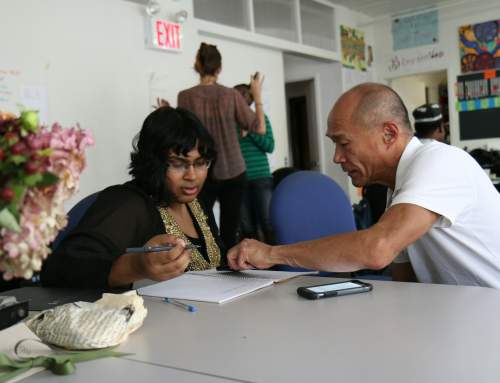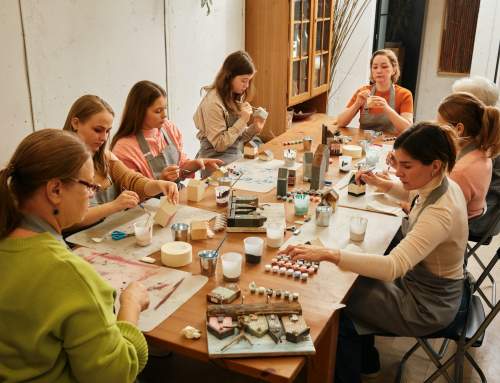I had coffee recently with a client who missed out on a promotion. It was the second leadership opportunity he’d applied for but didn’t get. The feedback from HR was he had the right qualifications and experience but didn’t present strongly enough for a leadership role. Put plainly, they didn’t like his vibe. This blog explains why having the right vibe will accelerate your career.
What is your ‘vibe’?
There’s a classic line in the Australian movie ‘The Castle’ where Darryl Kerrigan’s lawyer, Dennis Denuto, is arguing in court why Darryl’s house shouldn’t be compulsorily acquired by the government. His defense is “It’s the constitution. It’s Mabo. It’s justice. It’s law. It’s the vibe and ah, no that’s it. It’s the vibe. I rest my case.”
While the writers of The Castle were making fun of ‘the vibe’, it is a real thing.
Human beings are social animals. We use verbal and non-verbal cues to communicate with each other. The ability to communicate empathetically is known as emotional intelligence. People with strong emotional intelligence are often considered to have good people skills, that is, they pick up other’s ‘vibes’.
According to psychiatrist Dr Bernard Beitman, we sense a type of energy related to people’s thoughts and emotions.
“Our bodies may have receptors to pick up on this energy,” said Dr Beitman.
As adults, we learn how to select our words and behaviour with more discretion than children. But how many of us invest time reflecting on our own non-verbal communication and emotional intelligence? Have you ever seen your face in the mirror when you’re feeling angry? Although it’s your face, you probably don’t recognise it.
So, what is your vibe?
It’s how you communicate both verbally and non-verbally. It’s how you present yourself to the world (deliberately or unintentionally) and your ability to listen and interpret others empathetically.
Why is your vibe important in your career?
How you communicate and relate to others in the workplace is vitally important to your career. It matters at the start of your career but it really comes into focus as you progress into senior roles.
According to FastCompany, one of the skills that often derails executives is a lack of emotional intelligence. The Carnegie Institute of Technology conducted research that showed that 85 percent of our financial success was due to skills in “human engineering”, personality, and ability to communicate, negotiate, and lead. They found that only 15% was due to technical ability. Put plainly, people skills are the crucial skills for success.
When you are a leader, you hold more power than others in your organisation. All eyes are on you. You set the tone – rude or empathetic, self-aware or devil may care. The vibe you put out to the organisation is picked up by others, and you will become known for it.
As you move up the corporate ladder, it is easy for your vibe to morph. You earn more money, have more perks and gain more recognition. It’s easy to lose sight of what’s important, like how you and your decisions impact on others. Power is a corrupting force so it’s easy to lose perspective on what vibes you’re giving off and how your communication impacts on others. In the Greek classics, it was known as hubris, and it’s how many leaders go off the rails. Have you ever heard people say, “that person has changed since their promotion” or “they used to be so nice (before their promotion)”? That’s hubris in action.
Stepping into the Arena
In her book Daring Greatly, author Dr Brene Brown talks about the importance of being vulnerable. Dr Brown defines vulnerability as “uncertainty, risk and emotional exposure”.
Stepping up in your career puts you in a position of uncertainty, risk and emotional exposure. Dr Brown calls this ‘stepping into the arena’. Ask anyone what their over-riding feelings were in the first weeks of a promotion and many – myself included – would say “terror”. This stems from “stepping in the arena” where there are no guarantees you will succeed. It’s risky and with that comes a mixed bag of emotions – pride if you succeed or fear and shame if you fail.
The ability to ‘lean in’ to your vulnerability, to accept the price for stepping up is risk and emotional exposure, will impact on your vibe. That is, your team, your boss and senior leaders will sense if you’ve got walls up and that you are not being true to yourself.
Dr Brown says some people ‘engineer smallness’ into their working lives as a way to avoid uncertainty, risk and emotional exposure. There are many ways people engineer smallness into their lives such as:
- Not trying – if you don’t apply for the promotion, there’s no risk, uncertainty or emotional exposure
- Going for it half-heartedly. This is self-sabotage – you say to yourself that you want the opportunity but you’re not willing to accept and lean into the discomfort of uncertainty, risk and emotional exposure, so you behave in a way, conscientiously or sub-conscientiously, that makes sure you don’t get the job.
Of course, it’s natural to want to avoid risk, uncertainty and emotional exposure. That’s hard stuff especially at work, an environment where not everyone is your friend or trustworthy. But if you want to move forward with your career, it’s something you have to embrace. There are significant payoffs for allowing yourself to be vulnerable.
“Vulnerability is the birthplace of love, belonging, joy, courage, empathy and creativity,” said Dr Brown.
These positive feelings help you build an attractive vibe that keeps you connected and communicating positively with others and, importantly others with you.
How to Work on your Leadership Vibe
It’s a myth that leaders are born. Just because someone is an extrovert doesn’t mean they make an emotionally intelligent leader. In fact, sometimes, the opposite is true.
Be Self-Aware
Once my client recovered from the disappointment on missing out on the promotions, we sat down and had a chat about his vibe. This included a review of his communication (verbal and non-verbal). I won’t lie, for my client this was hard stuff! But to his credit, he recognised his vibe “stunk”. He realised he was giving off a negative vibe which he also found out later was a vibe the panel had picked up, commented upon and had used against him in deciding who got the job.
What we discovered was he was uncomfortable with uncertainty and emotional exposure, so his behavior came across as defensive (crossed arms, not listening to others, quick to retort, frowning more than smiling). This led us to talk about how to cultivate a growth mindset.
Develop a Growth Mindset
I was talking with a relative in her 80s about life and I asked her “at 80, do you feel that you’ve reached your destination in life?” and she said “no, you never get there”. I have to say that gave me pause to think!
Her point? We’re all on a journey. It might sound like a cheeseball line from a reality TV show but it’s actually very helpful if you think “I’m not there YET but I’m working towards it”.
You may not have all the leadership skills and qualities YET but, you can work on them. And by the way, no one has every leadership quality in abundance. No one has perfect communication skills, no one lives without fear of failure. But what good leaders do have is an understanding of their strengths and limitations and a mindset that allows them to accept failure (their own and others) is a possibility but also a learning experience.
Build Your Emotional Intelligence
If you give off a positive “vibe” then you can build strong relationships, you can work happily and productively with others AND others will want to work with you.
There are five elements to emotional intelligence:
- Self-awareness – understanding how your communication and behavior impacts on others
- Self- regulation – keeping check of your emotions and understanding how they influence your behavior and vibe
- Motivation – the drive to move forward, even in the face of adversity
- Empathy – understanding how others feel and behave and responding in a considerate way
- Social skills – the ability to maintain productive relationships with colleagues
With practice, you can cultivate your soft skills in each of these areas. There are online courses, you can work with a psychologist or a career coach can help you build your emotional intelligence skillset.
Your vibe will accelerate or be a handbrake for your career. If you want to step into the arena and take a leadership role, you need to have a good understanding of your verbal and non-verbal communication and cultivate your emotional intelligence. But this is all hard stuff to do on your own. I can help you understand your leadership strengths and limitations and help you build your leadership skills. Book a career conversation with me today.
Watch:
- The Power of Vulnerability
- How to build emotional intelligence in the workplace
Read:







